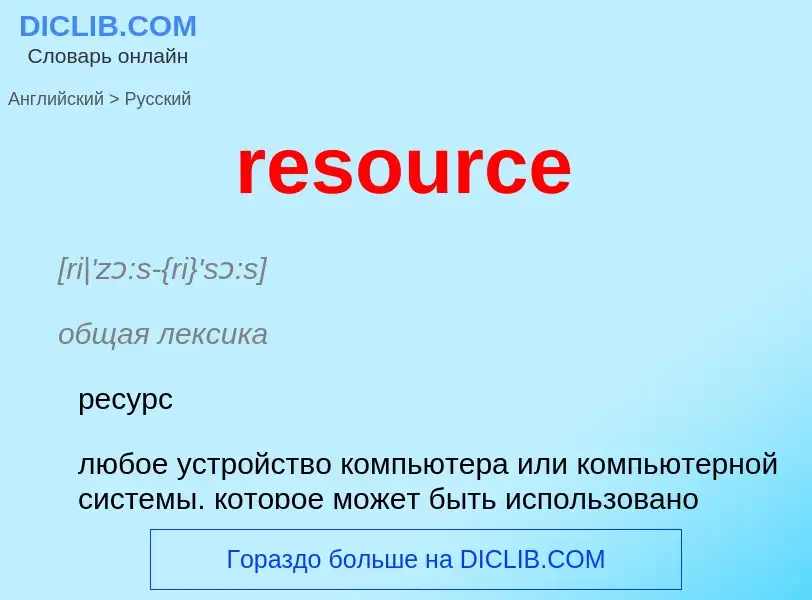Traducción y análisis de palabras por inteligencia artificial ChatGPT
En esta página puede obtener un análisis detallado de una palabra o frase, producido utilizando la mejor tecnología de inteligencia artificial hasta la fecha:
- cómo se usa la palabra
- frecuencia de uso
- se utiliza con más frecuencia en el habla oral o escrita
- opciones de traducción
- ejemplos de uso (varias frases con traducción)
- etimología
resource - traducción al Inglés
[ri|'zɔ:s-{ri}'sɔ:s]
общая лексика
ресурс
любое устройство компьютера или компьютерной системы, которое может быть использовано программой во время её работы (ОЗУ, диски, принтер и т.д.)
возможность
способ
средство
нефтегазовая промышленность
ресурсы, балансовые запасы (нефти, газа, конденсата)
богатства недр
Смотрите также
существительное
общая лексика
способ
средство
возможность
шанс
способ [средство] развлечения [отдыха]
изобретательность
находчивость
умение выходить из трудного положения
духовные ресурсы
внутреннее содержание человека
времяпрепровождение
занятие (во время отдыха)
отдых
развлечение
вероятность спасения
помощи и т. п.
ресурсы, средства, запасы
возможность, способ, средство
способ времяпрепровождения
находчивость, изобретательность
экономика
(материальные) запасы (напр., запасы сырья на складе)
ресурсы
средства (напр., средства существования, активы организации, финансовые ресурсы и т. п.)
природные богатства (напр., полезные ископаемые, земельные ресурсы и т. п.)
вычислительная техника
ресурс
Смотрите также
2) pl (денежные) средства
3) pl ресурсы; природные богатства
4) pl активы (банковские)
5) pl средства существования
- furnish the monetary resources
- squander resources
- ample resources
- conservation resources
- electric energy and power resources
- energy resources
- environmental resources
- exhaustible resources
- extra-budgetary resources
- forage resources
- groundwater resources
- human resources
- hydroelectric resources
- inanimate resource
- logistic resources
- manufacturing resources
- material resources
- nonhuman productive resources
- nonreproducible resources
- physical resources
- power resources
- primary resources
- reproducible resources
- tight resources
- uncommitted resources
- untapped natural resources
- water resources
Definición
Wikipedia
Resource refers to all the materials available in our environment which are technologically accessible, economically feasible and culturally sustainable and help us to satisfy our needs and wants. Resources can broadly be classified upon their availability — they are classified into renewable and non-renewable resources. They can also be classified as actual and potential on the basis of the level of development and use, on the basis of origin they can be classified as biotic and abiotic, and on the basis of their distribution, as ubiquitous and localised (private, community-owned, national and international resources). An item becomes a resource with time and developing technology. The benefits of resource utilization may include increased wealth, proper functioning of a system, or enhanced well-being. From a human perspective, a natural resource is anything obtained from the environment to satisfy human needs and wants. From a broader biological or ecological perspective, a resource satisfies the needs of a living organism (see biological resource).
The concept of resources has been developed across many established areas of work, in economics, biology and ecology, computer science, management, and human resources for example - linked to the concepts of competition, sustainability, conservation, and stewardship. In application within human society, commercial or non-commercial factors require resource allocation through resource management.
The concept of a resource can also be tied to the direction of leadership over resources, this can include the things leaders have responsibility for over the human resources, with management, help, support or direction such as in charge of a professional group, technical experts, innovative leaders, archiving expertise, academic management, association management, business management, healthcare management, military management, public administration, spiritual leadership and social networking administrator.
individuals exploit the same amount of resource per unit biomass) to absolutely size-asymmetric (the largest individuals exploit all the available resource). The degree of size asymmetry has major effects on the structure and diversity of ecological communities, e.g. in plant communities size-asymmetric competition for light has stronger effects on diversity compared with competition for soil resources. The degree of size asymmetry has major effects on the structure and diversity of ecological communities.

